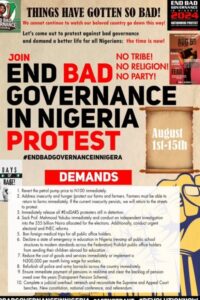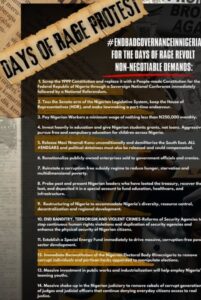What You Need to Know About Protesters’ Demands – Emkz
What You Need to Know About Protesters’ Demands – Emkz

The recent demands by protesters have been widely publicized, yet there is no consensus on what they seek. Let’s examine some of these demands:

1. Replacement of the 1999 Constitution with a New One:
Scrapping the existing constitution without a clear replacement plan is problematic. How would Nigeria be governed in the interim? Creating a constitution requires more than a simple draft; it’s a complex and extensive process. This demand essentially calls for an interim government, potentially leading to military rule, as the president’s legitimacy is derived from the constitution.
2. Abolishment of the Senate:
The president lacks the constitutional authority to dissolve any part of the government; such actions are typically within the purview of a military regime. Even making legislative work part-time would necessitate a constitutional amendment, which the president cannot unilaterally enact.
3. Increase Minimum Wage to ₦250,000:
While the president can advocate for higher wages, many state governors struggle to pay the current minimum wage of ₦30,000. Implementing such a significant increase across the board is impractical, as many states cannot afford it, and the president does not control state finances.
4. Invest in Education and Provide Grants:
Public universities have offered scholarships and bursaries for decades, and agencies like TETFUND, NDDC, and PTDF fund students domestically and internationally. While grants for education are commendable, they should be merit-based to maintain standards. Issues like compulsory education funding often falter at the state level, despite federal support.
5. Release of Nnamdi Kanu and EndSARS Protesters:
Nnamdi Kanu’s case is ongoing in the courts, and due process should be followed. Demilitarizing the southeast could lead to increased unrest, as seen in previous instances. Releasing and compensating all EndSARS protesters is contentious, as some were involved in criminal activities during the protests.
6. Renationalize Public Enterprises:
Identifying and reclaiming corruptly sold public enterprises requires a lengthy legal process. Such actions cannot be taken arbitrarily and would need substantial evidence and judicial proceedings.
7. Implement a Corruption-Free Subsidy Regime:
While a sound idea, past subsidy regimes have been marred by corruption. Ensuring transparency and proper management is crucial to prevent abuse.
8. Probe Corrupt Leaders and Recover Looted Funds:
Focusing on preventing future corruption may be more effective than extensive litigation against past leaders. Strengthening systems to block loopholes is essential.
9. Restructure Nigeria for Regional Autonomy:
Restructuring requires constitutional amendments, which are beyond the president’s immediate powers. It also demands competent leadership at the regional level to avoid repeating past failures.
10. End Banditry and Terrorism:
This should be a top priority. Collective effort from all societal segments, including parents, businesses, and local leaders, is crucial to combat these issues effectively.
11. Establish an Energy Fund:
Recent initiatives, like the bill allowing states to generate their own electricity and the establishment of an African energy development bank in Abuja, show progress. Utilizing these resources is vital.
12. Reform the Electoral Body:
Allegations against electoral officials need concrete evidence. Accusations should be backed by proof to maintain integrity.
13. Invest in Public Works and Industrialization:
While essential, achieving consensus on development projects is critical. Public support and clear planning are necessary.
14. Judicial Reforms:
The Nigerian Judicial Commission has a history of addressing corruption within the judiciary. Strengthening these efforts and ensuring transparency are important.
15. Diaspora Voting:
Allowing diaspora voting is a needed reform that should be implemented.
Additional Demands:
– Reducing petrol prices to ₦100 per litre is unrealistic due to the high costs of exploration, production, refining, and distribution.
– Addressing insecurity and hunger, closing IDP camps, electoral reforms, probing the electoral budget, implementing a living wage, free education, mandating public officials’ children to attend public schools, promoting made-in-Nigeria goods, and transitioning to a unicameral legislature are all valid concerns that require thoughtful and practical solutions.
TRENDING SONGS
 Ahmad Yerima: Naval Officer to Face No Sanctions After Clash with Wike – Matawalle
Ahmad Yerima: Naval Officer to Face No Sanctions After Clash with Wike – Matawalle
 Trending Video: Muslim Man Joins Wife in Hallelujah Challenge ‘Dress Like Your Miracle’ Night
Trending Video: Muslim Man Joins Wife in Hallelujah Challenge ‘Dress Like Your Miracle’ Night
 Woman Seeks Advice as Late Brother’s Wife Refuses to Mourn Him Following His Death With Alleged Mistress
Woman Seeks Advice as Late Brother’s Wife Refuses to Mourn Him Following His Death With Alleged Mistress
 Nobody Cares About Fine Girls In The UK, I Miss Nigeria — Nigerian Lady Laments
Nobody Cares About Fine Girls In The UK, I Miss Nigeria — Nigerian Lady Laments
 Wedding Called Off: How Lady Cancels Wedding After Finding Out Finance’s Affairs With Her Bestie
Wedding Called Off: How Lady Cancels Wedding After Finding Out Finance’s Affairs With Her Bestie
 Heartbreak in Ikeja: Lady Weeps After Fufu Found in New Phone Package
Heartbreak in Ikeja: Lady Weeps After Fufu Found in New Phone Package
 Twist of Fate: Man Who Questioned Phyna’s ₦1Billion Demand Mourns Brother in Dangote Truck Crash
Twist of Fate: Man Who Questioned Phyna’s ₦1Billion Demand Mourns Brother in Dangote Truck Crash
 Tragedy in Enugu: Dangote Truck Claims Lives of Family of Five
Tragedy in Enugu: Dangote Truck Claims Lives of Family of Five
 Bangkok Crackdown: Nigerian-Thai Couple in Police Net Over Drug Trafficking
Bangkok Crackdown: Nigerian-Thai Couple in Police Net Over Drug Trafficking
 Family Rift: Reno Omokri’s Ex-Wife Says He Deserted Their Special Needs Son
Family Rift: Reno Omokri’s Ex-Wife Says He Deserted Their Special Needs Son
Share this post with your friends on ![]()













